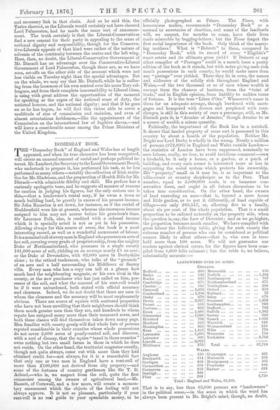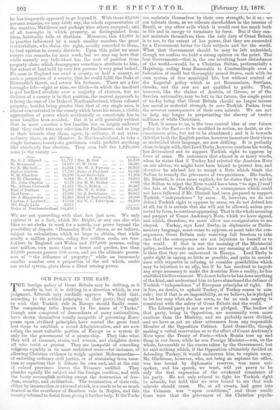DOMESDAY BOOK.
THE "Domesday Book" of England and Wales has at length appeared, and when its true character has been recognised, will create an unusual amount of social and perhaps political in- terest. Mr. Lambert,the Secretary to the Local Government Board, who undertook to prepare it, has performed his task, as he has performed so many others—notably the collection of Irish statis- tics for Mr. Gladstone, and the preparation of Health Bills for Mr. Disraeli—with admirable fidelity and skill. His preface has a curiously apologetic tone, and he suggests all manner of reasons for caution in judging his figures, but the only serious one is this,—that a landowner's rental may, if he owns a town or much building land, be greatly in excess of his present income. Sir John Ramsden is set down, for instance, as if the rental of Huddersfield were his at present, whereas the enormous income assigned to him may not accrue before his grandson's time. Sir Laurence Palk, also, is credited with a colossal income which it is specially noted is not as yet in his possession. Allowing always for this source of error, the book is a most interesting record, as well as a wonderful monument of labour. It is a nominal roll of every man in England who possesses an acre of her soil, covering every grade of proprietorship, from the mighty Duke of Northumberland, who possesses in a single county 181,000 acres of soil, yielding on an average nearly ±:1 an acre; or the Duke of Devonshire, with 83,000 acres in Derbyshire alone ; to the retired tradesman, who talks of the "grounds" of an acre and a half surrounding his Middlesex or Surrey villa. Every man who has a copy can tell at a glance how much land the neighbouring magnate, or his own rival in the county, or the new purchaser who has just called on him, pos- sesses of the soil, and what the amount of his rent-roll would be if it were unburdened, both stated with official accuracy and clearness. Indeed, we do not doubt that there are men to whom the clearness and the accuracy will be most unpleasantly obvious. There are scores of squires with scattered properties who have not been unwilling that their neighbours should think them much greater men than they are, and hundreds to whom repute has assigned many more than their measured acres, and both these classes will find themselves taken down many pegs. Men familiar with county gossip will find whole lists of persons reputed considerable in their counties whose whole possessions do not cover 3,000 acres of poorly-rented soil, and discover, with a sort of dismay, that the squire " taxed in three counties " owns nothing but two small farms in those in which he does not reside. On the other hand, the territorial magnates usually, though not quite always, come out with more than they had obtained credit for—not always, for it is a remarkable fact that only one or two men in England have a rent-roll of more than £100,000 not derived from city property—and some of the fortunes of country gentlemen like Sir T. D. Acland,—who is, we suspect from the roll, quite the first commoner among the owners of agricultural land,—Mr. Bassett, of Cornwall, and a few more, will create a momen- tary amazement which the objects of the feeling will not always approve. It is not so pleasant, particularly if your rent-roll is no real guide to your spendable money, to be ' officially photographed as Prince. The Times, with humourous malice, recommends "Domesday Book" as a manual to secretaries of charities, and some of the landlords will, we suspect, for months to come, have their lives made miserable by begging-letters ; but the Times forgot the first social importance of the book. Only.think of the marry- ing mothers! What is " Debrett" to them, compared to "Domesday Book," with its record of every " Eligible's" exact estate and its ultimate gross yield? If Debrett or any other compiler of "Peerages" could in a month issue a pretty edition of the book as it stands, but with notes giving each rich man's possessions in each county, he would make more than any "peerage" ever yielded. There they lie in rows, the names and addresses of the solidly rich throughout England and Wales,—of the two thousand or so of men whose wealth is exempt from the chances of business, from the "taint of trade," and in English opinion, from liability to sudden turns of fortune. It is the true "Libre d'Oro." Whosoever's name is there for an adequate acreage, though burdened with mort- gages and hampered with dowers and perplexed with rent- charges, is still in this society of ours a personage, still, as Mr. Disraeli puts it, is "Armine of Armine," though Armine be as a source of wealth a minus quantity.
Politically, the importance of the Book lies in a nutshell. It shows that landed property of some sort is possessed in this country by about a fourth of the population. Neither Mr. Bright nor Lord Derby is wholly in the wrong. Nearly a million of persons (972,836) in England and Wales outside London— the statistics of London have been suppressed, nominally to save labour, really, we fear, to avoid invidious comment—own a freehold, be it only a house, or a garden, or a patch of building, and every such owner is interested more or less in supporting the social system which protects his ownership. His " property," small as it may be, is as important to the villa-owner or country shopkeeper as to the Peer. That number, equal to 5,000,000 souls, is an immense con- servative force, and ought in all future discussions to be taken into consideration. On the other hand, the owners of land exceeding an acre—that is, beyond a mere house and little garden, or to put it differently, of land capable of tillage—are only 269,547, or, allowing five to a family, about six per cent. of the whole population. That is a small proportion to be enlisted naturally on the property side, when the question is, say, the Law of Distraint ; and as we go higher, the proportion becomes much smaller. We have compiled with great labour the following table, giving for each county the extreme number of persons who can be considered as political owners likely to affect others—that is, who own in free- hold more than 100 acres. We will not guarantee our readers against clerical errors, for the figures have been com- piled from 4,000 folio columns ; but the table is, we believe, substantially accurate :—
LANDOWNERS OVER 100 ACRES.
ENGLAND.
Bedford ...
360 Monmouth ... ... 416 Barks ...
544 Norfolk ... 1,602 Bucks ..
665 Northampton ... 767 Cambridge
871 Northumberland ... 671 Cheater ...
... 592 Nottingham ... ... 508 Cornwall ...
1,054 Oxford ... 610 Cumberland ...
...1,304 Rutland... ... ... 73 Derby ...
670 Salop ... ... 879 Devon ... ••• ...2,327 Somerset ... ... 1,892 Dorset ...
... 518 Southampton... ... 948 Durham...
... 605 Stafford... ... 742 Essex ...
... 1,660 Suffolk ... ... 1,842 Gloucester
... 1,036 Surrey ... ... 626 Hereford
... 764 Sussex 1,082 Hertford ...
... 519 Warwick ... ... 841.
Hantingdon
... 859 Westmoreland ... 518
Kent ...
...1,415 Wilts ... ... 779 Lancaster ...
...1,200 Worcester ... ... 710 Leicester
800 Yorkshire ...8,752 Lincoln ...
... 2,062
... 87,719 Middlesex ...
276 Total ...
WALES.
Anglesey
150 Glamorgan ... ... 481 Breakneck
414 Merionoth 288 Cardigan
489 Montgomery ...
Carmarthen ...
804 Pembroke ... 486 Carnarvon
213 Radnor ... 824 Denbigh...
4,750 Flint ...
Total : England and Wales, 42,469.
That is to say, less than 43,000 persons are "landowners" in the political sense,—in the sense in which the word has always been present to Mr. Bright's mind, though, no doubt, he has frequently appeared to go beyond it. With those 43,000 persons remains, we may fairly say, the whole representation of the counties, Middlesex and perhaps nine others excepted; and of all boroughs in which property, as distinguished from ideas, habitually tells at elections. Moreover, this 43,000 is in practice influenced by a much smaller number, the great territorialists, who claim the right, usually conceded to them, to lead opinion in county districts. Upon this point we must reserve our remarks for next week, but we may say here that while scarcely any individual has the sort of position from property alone which demagogues sometimes attribute to him, the extent of land held by very few persons is very great indeed. No man in England can evict a county, or half a county, or such a proportion of a county, that he could fulfil the Duke of Newcastle's threat, and return his footman. There are a few boroughs left—eight or nine, we think—in which the landlord is quc2 landlord absolute over a majority of electors, but no division of a county is in that position, the nearest approach to it being the case of the Duke of Northumberland, whose colossal property, besides being greater than that of any single man, is almost concentrated in the county which bears his name, a visible aggregation of power which accidentally or consciously has in most families been avoided. But it is still painfully evident that in most counties a few families are so largely endowed that they could veto any selection for Parliament, and so long as their tenants obey them, agree, in ordinary, if not extra- ordinary times, on any Member. In Northumberland, to take a single instance, twenty-six gentlemen could prohibit anything like absolutely free election. They own half the 1,220,000 acres in the county :-
Name.
Acreages. Name.
Acreages.
Mr. S. J. Allgood 15,773 Mrs. B. Ord ••• 13,810 W. Beaumont ... 14,279 C. W. Orde ... • • 13,522 Sir E. Blacken... ••• 15,854 Mr. W. J. Pawson .•. 10,919 Earl of Carlisle ... 17,789 Duke of Portland ... ••• 10,822
W. H. Charlton
19,730 Lord Rodesdale ••• 17,204 Sir H. Clavering 8,344 Mr. J. G. Riddell ••• 12,912 Mr. John Clayton ... 9,579 Sir M. W. Ridley ... ••• 9.696 Mr. Adison Creswell ... 15,251 Mr. J. Ridley ... ••• 10,367 Eirl of Durham 15,807 Mr. W. C. Selby ... ••• 25,327 Earl Grey... ... 17;599 Sir J. Swinburne ••• 28,057
Sir J. Baggerston
14,285 Earl of Tankerville... ••• 28,930 Captain J. Leyland... ... 17,644 Sir W. C. Trevelyan ••• 21,342 Mr. Hugh Lisle 9,975
575,924 Duke of Northumberland 181,616
We are' not quarrelling with that fact just now. We only register it as a fact, which Mr. Bright, or any one else who likes to set clerks to work for a month, can prove beyond the possibility of dispute. "Domesday Book" shows, as we believe, subject to calculations which we hope to obtain, that while nearly a million persons, ruling five million souls, are free- holders in England and Wales, and 227,000 persons, ruling one million, own more than a house and garden, less than 43,000 persons possess 100 acres, and are the ultimate posses- sors of " the influence of property;" while an immensely smaller number own a proportion of the soil which, under our social system, gives them a direct vetoing power.



































 Previous page
Previous page